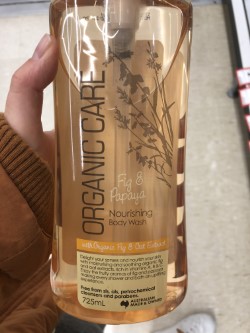Can You Eat Your Shampoo?
- Nathan Waters
- Jul 23, 2018
- 3 min read
By now everyone is familiar with the clever marketing strategies big companies are using to reel us in, claiming their products are organic, gluten free, paraben free, etc. Brown paper bag packaging, placing buzz words in precise locations just to get us to agree that whatever is in their product is perfectly safe.
We’re not talking about food this time though – what we’re looking at now is how your personal care products can influence your health.
How many times have you actual had a look at the ingredients in your personal care products? Items such as soap, shampoo and deodorants – do you really know what you are putting on your skin?
The skin is our largest organ, yet we rarely give it a second thought! It absorbs everything and anything, so we need to make sure that what we are putting on it is harmless and safe to go inside your body. If you have an allergy or a sensitivity to something, gluten for example, you need to make sure that any and all personal care products you use a free from gluten and other triggers.
For individuals with coeliac's disease it is common to have small flare ups despite eating a diet free from all forms of gluten and wheat. Flick over the bottle of the shampoo they are using and you’ll see that it will probably have added wheat protein for ‘extra strength and nourishment’ or whatever other line they come up with. I know that most people are not coeliac's, however I do the that the majority of individuals these days have some type of health complaint! For those who are health conscious, you will probably already be using ‘better’ versions of personal care products. Unfortunately, the majority of them are not all that much ‘better’ for you.
Here’s a step-by-step approach to determine if your product is harmful or harmless:
Does it contain a fragrance? Fragrance can be displayed directly as ‘fragrance’ or can use other words including ‘parfum’, ‘perfume’ and ‘pthalalates’. They are hormone disruptors and known carcinogens so steer clear.
Avoid anything ending in ‘ene’ - additives such a benzene are known carcinogens and mutagens, meaning that they have the ability to alter your genetic material or DNA.
Phenoxyethanol – found in a large amount of products deemed ‘organic’ or ‘natural’ as it is extremely cheap and effective. They are hormone disruptors and previously been shown to disrupt the brain and nervous system in animal studies at moderate doses.
If the product you are looking at passes these 3 tests then you are on your way to using it! As a fail safe, any of the other ingredients listed that you are not familiar with should still be checked.
There is an app called The Chemical Maze that will set you back around $11 from your app store. You type in the additive or ingredient and it will give you a traffic light system (red is bad, yellow is ok, green is good). Out of all of the apps you have on your phone, this is going to be the most utilised when shopping!
If your personal care product is registered with ewg.org/skindeep you can type it in and get an accurate rating, similar to the app above.
Don’t be fooled by the sneaky packaging or buzz words – scan the ingredients and make an educated decision rather than falling victim to the marketing gods!




